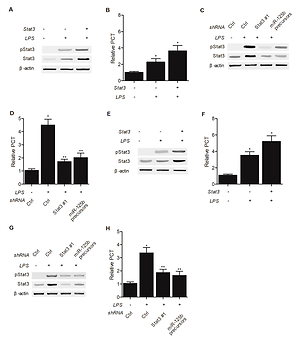Current issue
Archive
Manuscripts accepted
About the Journal
Editorial office
Editorial board
Section Editors
Abstracting and indexing
Subscription
Contact
Ethical standards and procedures
Most read articles
Instructions for authors
Article Processing Charge (APC)
Regulations of paying article processing charge (APC)
INFECTIOUS DISEASES / RESEARCH PAPER
Dysregulation of microRNA-125b is involved in the pathogenesis of post-operative infection via modulating the STAT3/procalcitonin (PCT) signaling pathway
1
Affiliated Hospital of Shaanxi University of Chinese Medicine, China
2
Xianyang Central Hospital, Xianyang, China
Submission date: 2020-08-07
Final revision date: 2020-11-05
Acceptance date: 2020-11-12
Online publication date: 2021-05-03
KEYWORDS
TOPICS
ABSTRACT
Introduction:
Procalcitonin (PCT) has been reported to function as a predictive biomarker of post-operative infection. In this study, we aimed to explore the mechanisms underlying the regulation of PCT expression.
Material and methods:
72 children diagnosed with post-operative infection and 58 children without post-operative infection were recruited in this study. Computational analysis, luciferase assay, real-time PCR, Western-blot analysis, and assays of post-operative C-reactive protein (CRP), erythrocyte sedimentation rate (ESR) and PCT were performed to investigate the mechanisms underlying the regulation of PCT expression.
Results:
MiR-125b was found to repress STAT3 expression with putative binding sites in 3’UTR of STAT3. The levels of PCT and miR-125b in non-infection group remained stable from day 0 to day 5, while the level of PCT was increased in the infection group along with a decreased level of miR-125b from day 1 to day 5. The post-operative levels of CRP and ESR in both non-infection and infection groups were evidently increased in a time-dependent manner, but the levels of miR-106b and miR-20a in both non-infection and infection groups remained stable. The area under the curve (AUC) values of PCT, CRP, ESR, miR-125b, miR-106b and miR-20a demonstrated that only miR-125b and PCT were involved in infection. Transfection with miR-125b reduced STAT3 expression, while the activation of STAT3 by lipopolysaccharide (LPS) treatment up-regulated PCT production. Finally, miR-125b down-regulated the expression of PCT by targeting STAT3.
Conclusions:
Taken together, we suggested that miR-125b was involved in the prognosis and diagnosis of poster-operative infection by modulating the signaling pathway of miR-125b/STAT3/PCT.
Procalcitonin (PCT) has been reported to function as a predictive biomarker of post-operative infection. In this study, we aimed to explore the mechanisms underlying the regulation of PCT expression.
Material and methods:
72 children diagnosed with post-operative infection and 58 children without post-operative infection were recruited in this study. Computational analysis, luciferase assay, real-time PCR, Western-blot analysis, and assays of post-operative C-reactive protein (CRP), erythrocyte sedimentation rate (ESR) and PCT were performed to investigate the mechanisms underlying the regulation of PCT expression.
Results:
MiR-125b was found to repress STAT3 expression with putative binding sites in 3’UTR of STAT3. The levels of PCT and miR-125b in non-infection group remained stable from day 0 to day 5, while the level of PCT was increased in the infection group along with a decreased level of miR-125b from day 1 to day 5. The post-operative levels of CRP and ESR in both non-infection and infection groups were evidently increased in a time-dependent manner, but the levels of miR-106b and miR-20a in both non-infection and infection groups remained stable. The area under the curve (AUC) values of PCT, CRP, ESR, miR-125b, miR-106b and miR-20a demonstrated that only miR-125b and PCT were involved in infection. Transfection with miR-125b reduced STAT3 expression, while the activation of STAT3 by lipopolysaccharide (LPS) treatment up-regulated PCT production. Finally, miR-125b down-regulated the expression of PCT by targeting STAT3.
Conclusions:
Taken together, we suggested that miR-125b was involved in the prognosis and diagnosis of poster-operative infection by modulating the signaling pathway of miR-125b/STAT3/PCT.
Share
RELATED ARTICLE
We process personal data collected when visiting the website. The function of obtaining information about users and their behavior is carried out by voluntarily entered information in forms and saving cookies in end devices. Data, including cookies, are used to provide services, improve the user experience and to analyze the traffic in accordance with the Privacy policy. Data are also collected and processed by Google Analytics tool (more).
You can change cookies settings in your browser. Restricted use of cookies in the browser configuration may affect some functionalities of the website.
You can change cookies settings in your browser. Restricted use of cookies in the browser configuration may affect some functionalities of the website.



